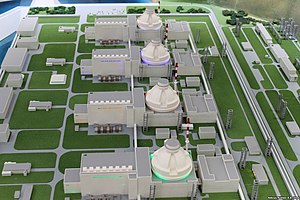Akkuyu Nuclear Power Plant
| Akkuyu Nuclear Power Plant | |
|---|---|
 A model of the Akkuyu Nuclear Power Plant in Mersin | |
 | |
| Official name | Akkuyu Nükleer Güç Santrali A.Ş. |
| Country | Turkey |
| Location | Akkuyu, Mersin |
| Coordinates | 36°08′40″N 33°32′28″E / 36.1444°N 33.5411°E |
| Status | Under construction |
| Commission date | 2022 (scheduled) |
| Construction cost | US$20 billion |
| Owner | Akkuyu NGS Elektrik Üretim A.Ş. |
| Nuclear power station | |
| Reactor type | VVER-1200/491 PWR |
| Reactor supplier | Atomstroyexport |
| Power generation | |
| Units planned | 4 × 1,200 MW |
| Nameplate capacity | 4,800 MW |
| External links | |
| Website | www.akkunpp.com |
| Commons | Related media on Commons |
The Akkuyu Nuclear Power Plant (Template:Lang-tr) is a nuclear power plant under construction at Akkuyu, in Büyükeceli, Mersin Province, Turkey. It will be the country's first nuclear power plant.[1]
History
In May 2010, Russia and Turkey signed an agreement that a subsidiary of Rosatom — Akkuyu NGS Elektrik Uretim Corp. (APC: Akkuyu Project Company) — would build, own, and operate a power plant at Akkuyu comprising four 1,200 MW VVER units.[2] The agreement was ratified by the Turkish Parliament in July 2010.[3]
Engineering and survey work started at the site in 2011.[4][5] The construction of the first unit will begin in 2016, with the four units put into service in 2022–25.
In 2013, Russian nuclear construction company Atomstroyexport (ASE) and Turkish construction company Ozdogu signed the site preparation contract for the proposed Akkuyu nuclear power plant. The contract includes excavation work at the site.[6]
The official launch ceremony took place in April 2015, and the first unit is expected to be completed in 2022.[7]
Location advantages

The government chose this site because of the low population density and low risk of earthquakes. Seismic hazard in Mersin Province, in terms of peak ground acceleration with a 10% chance of being exceeded (or a 90% chance of not being exceeded) within the next 50 years, is a 1.6 %g (percent of gravity) peak acceleration.
Finance
Financing is provided by Russian investors, with 93% from a Rosatom subsidiary. Up to 49% of shares may be sold later to other investors.[8] Potential investors are Turkish companies Park Teknik and Elektrik Üretim.[4]
Turkish Electricity Trade and Contract Corporation (TETAS) has guaranteed the purchase of 70% power generated from the first two units and 30% from the third and fourth units over a 15-year power purchase agreement. Electricity will be purchased at a price of 12.35 US cents per kW·h and the remaining power will be sold in the open market by the producer.[9]
Objections
The most important objection is that Büyükeceli and the surrounding coastline may lose its touristic potential after the realization of the project.[10] Büyükeceli residents are also worried that the already low population of the town may further decrease and the town may lose its township status. [citation needed]
On 17 April 2011 a human chain was formed in Mersin to protest the decision.[11] It was planned that there would be 30 locations to form chains along the highway connecting Mersin to Akkuyu. But the participation was higher than the expected and several of these chains were merged with. The east end of the chain was in Mersin midtown and it reached some 20 kilometres (12 mi) west along the highway uninterrupted. Also the settlements at the west including the district centers of Silifke and Erdemli as well as Büyükeceli, the town nearest to construction site participated. "The earthquake and tsunami in Japan proved how dangerous nuclear technology is," said Sabahat Aslan, a spokesperson for the Mersin Anti-Nuclear Platform. “We organized this protest to say ‘no’ to nuclear power plants, which will put future generations in danger.”[12]
On 12 January 2015, it was reported that the signatures of specialists on a government-sanctioned environmental impact report had been forged. The specialists had resigned six months prior to its submission, and the contracting company had then made unilateral changes to the report.[13] The revelation sparked protest in North Nicosia. The construction of the Akkuyu plant is controversial in Cyprus, due to its close proximity to the island.[14]
Construction stoppage rumors
On 9 December 2015, the news agency Reuters reported that Rosatom stopped construction work at the power plant and that Turkey was assessing other potential candidates for the project.[15] But Rosatom and the Turkish Energy and Natural Resource Ministry, promptly refuted the statement.[16] Despite tensions mounted between Russia and Turkey, due to Turkish downing of Russian Airplane on November 24 (2015), Russia President Putin stated that any decision to continue is a purely commercial issue.[17] A source told RIA Novosti that a company set up to construct the nuclear plant continued its operations in Turkey.[18][19]
References
- ^ "Welcome to the site of Akkuyu NPP JSC!". Akkuyu NGS location. Akkuyu NGS A.Ş., akkunpp.com. Retrieved 2 October 2012.
- ^ "Russian plant for Turkey's Akkuyu". World Nuclear News. 13 May 2010. Retrieved 13 December 2011.
- ^ "Governmental approval for Turkish construction plan". World Nuclear News. 15 July 2010. Retrieved 13 December 2011.
- ^ a b "Site work to start for Turkish plant". World Nuclear News. 25 February 2011. Retrieved 13 December 2011.
- ^ Ground broken for first nuclear plant amid safety concerns and protests
- ^ "Russia And Turkey Sign Akkuyu Site Preparation Contract". NucNet. 22 February 2013. Retrieved 3 April 2013.
- ^ "Ground broken for Turkey's first nuclear power plant". World Nuclear News. 15 April 2015. Retrieved 19 April 2015.
- ^ "A case study of a Russian international project: Turkey's Akkuyu project". Nuclear Engineering International. 3 December 2012. Retrieved 3 January 2014.
- ^ "Akkuyu Nuclear Power Plant, Turkey". power-technology.com. Net Resources International. Retrieved 25 April 2011.[unreliable source?]
- ^
"Mersin'de Yapılması Planlanan Nükleer Santral" (in Turkish). Anatolian Agency. 1 June 2010. Retrieved 13 December 2011.
{{cite news}}: Unknown parameter|trans_title=ignored (|trans-title=suggested) (help) - ^ Online news Template:Tr icon
- ^ Hürriyet newspaper English edition
- ^ "Signatures on nuclear power plant environmental impact report forged". Today's Zaman. 12 January 2015. Retrieved 18 January 2015.
- ^ "Lefkoşa'da Nükleer Karşıtı Yürüyüş: 'Akkuyu'da Nükleer En Çok Bizi Etkiler'". Gazeddakıbrıs (in Turkish). 17 January 2015. Retrieved 18 January 2015.
- ^ "Russia halts Turkey nuclear work, Ankara looks elsewhere". Thomson Reuters. 9 December 2015. Retrieved 22 December 2015.
- ^ "Construction of Turkey's first nuclear plant continues as planned". Daily Sabah. 9 December 2015. Retrieved 22 December 2015.
- ^ "Russia not to halt Akkuyu nuclear power plant in Turkey, Putin says". Daily Sabah. 17 December 2015. Retrieved 22 December 2015.
- ^ "Putin Denies Russia Invested $3.5Bln in Turkey's Akkuyu Nuclear Power Plant". Sputnik International. 17 December 2015. Retrieved 22 December 2015.
- ^ "Akkuyu nuke plant in Turkey to be decided by firms: Putin". Anadolu Agency. 18 December 2015. Retrieved 22 December 2015.

